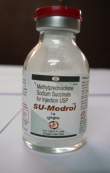|
Each
Tablet contains:
methylprednisolone sodium succinate for
injection, USP
INDICATIONS
:
When oral
therapy is not feasible, and the
strength, dosage form and route of
administration of the drug reasonably
lend the preparation to the treatment of
the condition, Su-Medrol Sterile Powder
is indicated for intravenous or
intramuscular
use in the following conditions:
Endocrine Disorders
Rheumatic Disorders
Collagen Diseases
Dermatologic Diseases
Allergic States
Ophthalmic Diseases
GastrointestinalDiseases
Respiratory Diseases
Hematologic Disorders
DOSAGE AND ADMINISTRATION :
When high dose therapy is desired, the
recommended dose of Su-Medrol Sterile
Powder is 30 mg/kg administered
intravenously over at least 30 minutes.
This dose may be repeated every 4 to 6
hours for 48 hours.
In general, high dose corticosteroid
therapy should be continued only until
the patient's condition has stabilized;
usually not beyond 48 to 72 hours.
Although adverse effects associated with
high dose short-term corticoid therapy
are uncommon, peptic ulceration may
occur. Prophylactic antacid therapy may
be indicated.
In other indications initial dosage will
vary from 10 to 40 mg of
methylprednisolone depending on the
clinical problem being treated. The
larger doses may be required for
short-term management of severe, acute
conditions. The initial dose usually
should be given intravenously over a
period of several minutes. Subsequent
doses may be given intravenously or
intramuscularly at intervals dictated by
the patient's response and clinical
condition. Corticoid therapy is an
adjunct to, and not replacement for
conventional therapy.
Dosage may be reduced for infants and
children but should be governed more by
the severity of the condition and
response of the patient than by age or
size. It should not be less than 0.5 mg
per kg every 24 hours.
USE IN PREGENANCY :
Since adequate human reproduction
studies have not been done with
corticosteroids, the use of these drugs
in pregnancy, nursing mothers, or women
of childbearing potential requires that
the possible benefits of the drug be
weighed against the potential hazards to
the mother and embryo or fetus. Infants
born of mothers who have received
substantial doses of corticosteroids
during pregnancy should be carefully
observed for signs of hypoadrenalism.
Average and large doses of cortisone or
hydrocortisone can cause elevation of
blood pressure, salt and water
retention, and increased excretion of
potassium. These effects are less likely
to occur with the synthetic derivatives
except when used in large doses.
Dietary salt restriction and potassium
supplementation may be necessary. All
corticosteroids increase calcium
excretion.
Administration of live or live,
attenuated vaccines is contraindicated
in patients receiving immunosuppressive
doses of corticosteroids. Killed or
inactivated vaccines may be administered
to patients receiving immunosuppressive
doses of corticosteroids; however, the
response to such vaccines may be
diminished. Indicated immunization
procedures may be undertaken in patients
receiving nonimmunosuppressive doses of
corticosteroids.
The use of Su-Medrol Sterile Powder in
active tuberculosis should be restricted
to those cases of fulminating or
disseminated tuberculosis in which the
corticosteroid is used for the
management of the disease in conjunction
with appropriate antituberculous
regimen.
If corticosteroids are indicated in
patients with latent tuberculosis or
tuberculin reactivity, close observation
is necessary as reactivation of the
disease may occur. During prolonged
corticosteroid therapy, these patients
should receive chemoprophylaxis.
Because rare instances of anaphylactic (eg,
bronchospasm) reactions have occurred in
patients receiving parenteral
corticosteroid therapy, appropriate
precautionary measures should be taken
prior to administration, especially when
the patient has a history of allergy to
any drug.
There are reports of cardiac arrhythmias
and/or circulatory collapse and/or
cardiac arrest following the rapid
administration of large IV doses of Su-Medrol
(greater than 0.5 gram administered over
a period of less than 10 minutes).
Bradycardia has been reported during or
after the administration of large doses
of methylprednisolone sodium succinate,
and may be unrelated to the speed or
duration of infusion.
Wallpapers :

CLICK ON PHOTO TO SEE LARGE.
|
